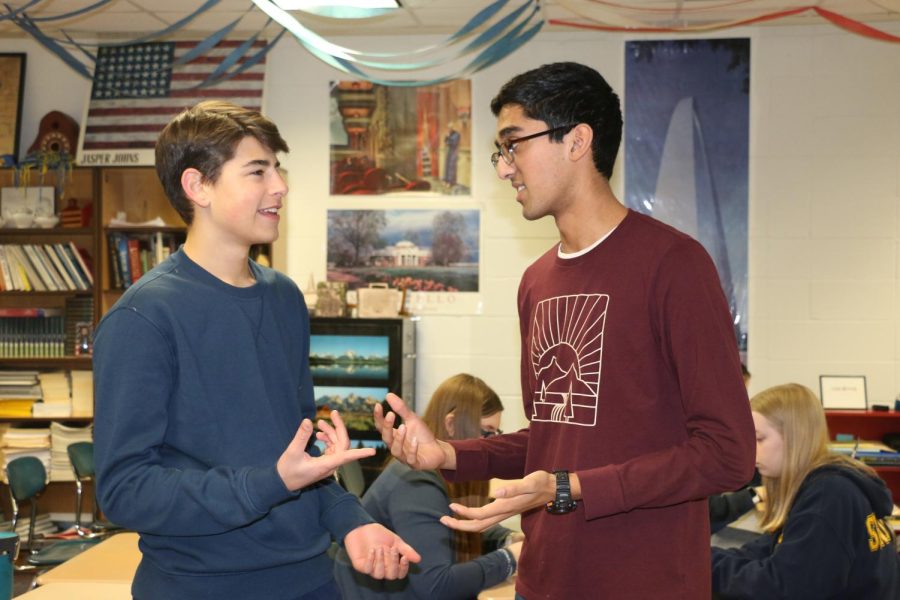Two years ago, senior Tanay Acharya ran for a class officer position. When he got elected, initially he said he was excited.
“I thought I would have more of a voice in things,” Acharya said.
However, Acharya said he quickly became disappointed. He said he felt less like a liaison for the student body and more like a figurehead.
“You don’t talk to anybody. We just announced stuff, if anything,” Acharya said. “But everything that we do is very set up. It feels more like (if) you go into a program, a volunteer opportunity. They tell you what you’re doing.”
representation
But while Acharya said he didn’t feel like he was actually representing the student body and its interests, Senator and junior Gabi Bradley said she’s had a different experience. Bradley said she believes student government, specifically Senate, allows for a variety of perspectives to be heard.
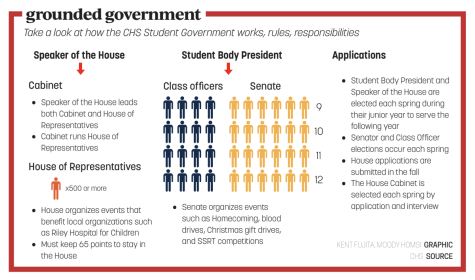
“I think Senate is so diverse, like, everyone’s involved in so many activities,” Bradley said. “Because of that, it allows for us to get a better idea of the entire student body because there’s a lot of people. The fact that we have people from a bunch of different groups and a bunch of different activities and walks around the school helps to give us a good, well-rounded idea of what students would like.”
Senate sponsor Michelle Foutz said she agrees with Bradley.
She said, “I think that the Senate tries to represent the student body to the best of their ability. They send out surveys. They try to get feedback from students on different events and how they organize events.”
However, some students, like sophomore Amna Ahmad, said they don’t see these efforts.
“I do not think that my voice is heard by the student government,” Ahmad said. “I do not think that student government is approachable at all. The only way they would be (is) if you knew the direct senator. Also, we rarely receive communication from the senators as well.”
Bradley said she understands this concern and believes members of student government need to do more to represent student interests.
“I feel like it’s more on you as the student leader. If you’re not reaching out to the students, that’s not necessarily (the) administration’s fault. It’s more like you’re not being a leader,” she said. “Like, I ask my friends all the time, ‘Would you like this spirit day, this spirit day, this spirit day?’ And they’ll be like, ‘I think that’s stupid, I really like that one, I feel kind of iffy on that one.’ Even in my own small sphere of influence, especially with the big school, it’s really hard to garner everybody’s opinions and the ways they view things.”
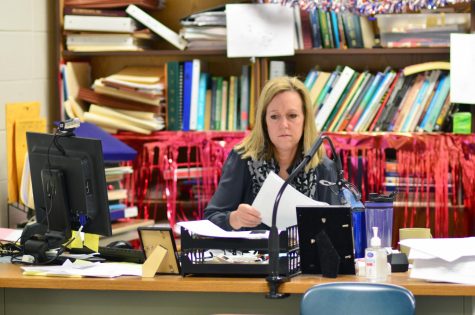
(Chenyao Liu)
responsibilities
Nina Federici, Cabinet member and sophomore, said her branch of student government represents the student body by planning events and fundraising for Riley Children’s Hospital.
“We plan events, we reach out to a lot of people in our community as well as consistently talking to the vice principals in our school,” she said. “With all the events that we do outside of school, and all the community members we bring in, I think we really represent the school to Carmel.”
Similarly, Foutz said Senate organizes events throughout the school year for the students and staff.
“We organize a whole bunch of events including all the Homecoming events, the winter formal, SRT competitions, the blood drive and all of the staff appreciation,” Foutz said.
Acharya said as a class officer, he helped organize school events, but he said he didn’t feel like he actually had power.
“We technically planned prom, (but) we just attended meetings with some people and the only thing I think we actually contributed was the music, but even that I’m not sure,” Acharya said. “I feel like student government should be able to have those conversations with administration. But instead, it’s more like we just follow their orders. We don’t ever tell them stuff about what people might think.”
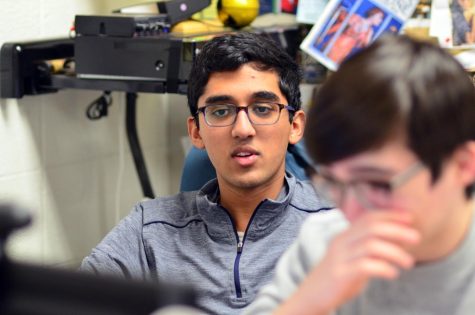
Ahmad said she agrees with Acharya, and feels like student government doesn’t have the power to fully represent student interests.
“I think that the power lies with the administration, rather than the Senate. On top of that, the school has so many students that the admin cannot listen to every single student’s concerns,” she said. “At some point, if you really wanted something done, I would tell your parents to talk to the administration.”
Acharya said he saw examples where the student body made changes without student government’s support.
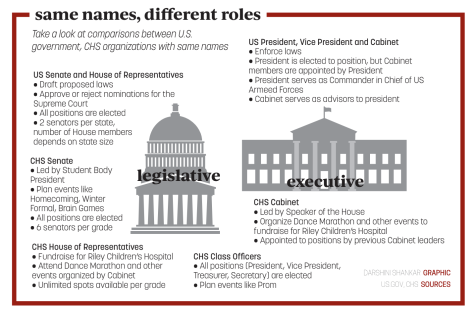
“I remember, specifically, sophomore year when (administration) wasn’t going to do AP classes online and a lot of kids got really mad about that. Then, they ended up putting AP classes online. That’s an example of student (power), the student government would not be able to do that at all,” Acharya said. “It really was just led by students.”
To that end, Bradley said she believes the role of student government must go beyond organizing events to advocating for the student body.
“I feel like the role of student government should essentially be a way in which to bridge the gap between where administration is and where students are,” she said. “I think we as a student government should be addressing more things than we do…I think we should be doing more to advocate for student welfare and student well-being because we do a lot for these different events and that’s what we really focus in on.”
In line with Bradley, Foutz said Senate is trying to address student welfare.
“We have a lot of SSRT competitions that we do, that we believe helps student welfare. It allows students to bond with each other, which is really important for student well-being,” she said. “Especially in a school so big, it is super important for students to talk with people that they do not know and meet new people.”
Ahmad said she wants student government to address more issues beyond planning events.
“Personally, I believe that student government does more fundraising and event-planning rather than actually representing the student body and implementing changes,” Ahmad said.
Ultimately, Bradley said she believes student government tries to represent and help students, but it’s not a perfect system.
“I, personally, would want to focus on trying to push the boundaries. Not only are we doing events for students but we (should be) trying to protect the student body’s welfare, well-being,” Bradley said. “Because we are so diverse and because we’re continuing to diversify, I hope that allows us to showcase different people’s ideologies, showcase different people’s cultures, different people’s walks of life and what they’ve experienced personally to help us help everyone.”

































![AI in films like "The Brutalist" is convenient, but shouldn’t take priority [opinion]](https://hilite.org/wp-content/uploads/2025/02/catherine-cover-1200x471.jpg)









































![Review: “The Immortal Soul Salvage Yard:” A criminally underrated poetry collection [MUSE]](https://hilite.org/wp-content/uploads/2025/03/71cju6TvqmL._AC_UF10001000_QL80_.jpg)
![Review: "Dog Man" is Unapologetically Chaotic [MUSE]](https://hilite.org/wp-content/uploads/2025/03/dogman-1200x700.jpg)
![Review: "Ne Zha 2": The WeChat family reunion I didn’t know I needed [MUSE]](https://hilite.org/wp-content/uploads/2025/03/unnamed-4.png)
![Review in Print: Maripaz Villar brings a delightfully unique style to the world of WEBTOON [MUSE]](https://hilite.org/wp-content/uploads/2023/12/maripazcover-1200x960.jpg)
![Review: “The Sword of Kaigen” is a masterpiece [MUSE]](https://hilite.org/wp-content/uploads/2023/11/Screenshot-2023-11-26-201051.png)
![Review: Gateron Oil Kings, great linear switches, okay price [MUSE]](https://hilite.org/wp-content/uploads/2023/11/Screenshot-2023-11-26-200553.png)
![Review: “A Haunting in Venice” is a significant improvement from other Agatha Christie adaptations [MUSE]](https://hilite.org/wp-content/uploads/2023/11/e7ee2938a6d422669771bce6d8088521.jpg)
![Review: A Thanksgiving story from elementary school, still just as interesting [MUSE]](https://hilite.org/wp-content/uploads/2023/11/Screenshot-2023-11-26-195514-987x1200.png)
![Review: "When I Fly Towards You", cute, uplifting youth drama [MUSE]](https://hilite.org/wp-content/uploads/2023/09/When-I-Fly-Towards-You-Chinese-drama.png)
![Postcards from Muse: Hawaii Travel Diary [MUSE]](https://hilite.org/wp-content/uploads/2023/09/My-project-1-1200x1200.jpg)
![Review: "Ladybug & Cat Noir: The Movie," departure from original show [MUSE]](https://hilite.org/wp-content/uploads/2023/09/Ladybug__Cat_Noir_-_The_Movie_poster.jpg)
![Review in Print: "Hidden Love" is the cute, uplifting drama everyone needs [MUSE]](https://hilite.org/wp-content/uploads/2023/09/hiddenlovecover-e1693597208225-1030x1200.png)
![Review in Print: "Heartstopper" is the heartwarming queer romance we all need [MUSE]](https://hilite.org/wp-content/uploads/2023/08/museheartstoppercover-1200x654.png)




